What tools for teamwork make ordinary employees of the Dream Team?
Have you ever wondered what percentage of successfully implemented projects you completed yourself, and how many of them required the participation of the team? It seems that the answer is obvious: for cool projects a cool team is needed.

Any motivated product manager should not only take care of professional skills, learn new methodologies and apply the latest grow hacks , but also try to create a strong and successful team.
What makes teams stronger and stronger? Well-established cooperation inside is one of the key aspects that help teams cope with complex tasks and withstand any obstacles. A united team is the dream and goal of any product manager.
')
What is the power of cooperation? And what secret tools help managers create strong teams?
Naturally, any professional tool for a manager and a team is not a panacea.
Product managers should think about the quality of communication, starting with interviews, employee's probationary periods, and knowing how to brainstorm properly . Even after a successful release during team building, it is important to think about how to raise the level of team collaboration to a new level.
This article describes 9 types of tools that will help create a strong team spirit and streamline team workflows. All of these tools have different goals, some of them are paid, some are free. Some of them are suitable for all products, and some highly specialized.
This list is quite subjective, therefore, after each given example, several alternatives are proposed so that any reader can choose the best for himself from the above:

Slack is a real-time chat service that has gained rapid popularity after being distributed to Silicon Valley companies.
The service works on the basis of channels and includes voice and video calls, although these Slack components are not as popular as text chat rooms. Here you can add pictures, emoji, GIF, share documents and organize group chats.
How does Slack work?
You can use Channels as chats or public streams. This can be done in just a few clicks. You can also write directly to a specific contact, attach documents and files for him.
The “Private Groups” option allows you to organize conversations with specific team members. You can invite developers, sales professionals, HRov and so on.
All content in Slack is searchable from a single search box. You can also use the help of the Slackbot bot, which can give you more information, remind you of urgent matters and be useful on other issues.

Alternatives: HipChat, Microsoft Teams
Hygger is a complete product management platform for growing companies. The service can be used to work together in small and large teams. Hygger offers a range of quality and useful features:
All these functions and suggestions help to manage the product life cycle and optimize team collaboration by tracking every step of all team members, without losing any small details.
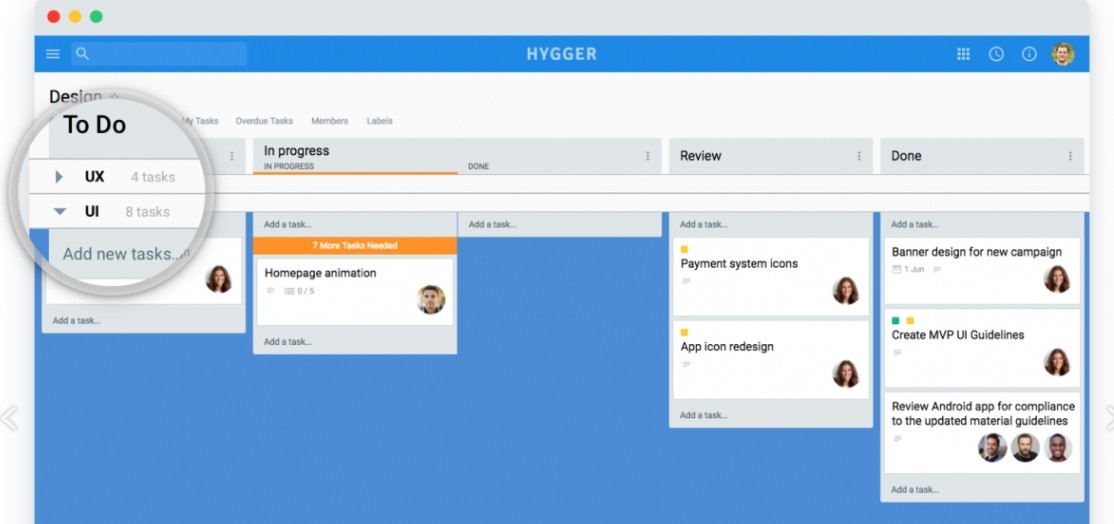
Alternatives: Trello, Aha, Asana.
The service is widely used by companies for internal remote communication as an instant messaging or screen-sharing video conferencing. It helps to organize meetings and presentations without a special separate planning tool. You can send invitations to any team member and coordinate actions right in the sidebar.
Individual chats allow team members to collaborate in a group project, chat with colleagues, customers or other team members, make changes to Google docks, etc.

Alternatives: Skype, Amazon Chime, Join.me
OneNote will be useful if you need to control the movement of documents and share them with your team. This is a kind of collaborative notebook that makes it easy to distribute a large amount of data among team members.
OneNote is more than just working with documents. Many companies use it as an ideal tool for project management in teams. This is a free tool. Using different sections and OneNote pages, you can provide your team members with relevant information at any time that is convenient for you. Here you can create multiple sections and sub-pages for storing important data.
OneNote allows you to share information from any device.
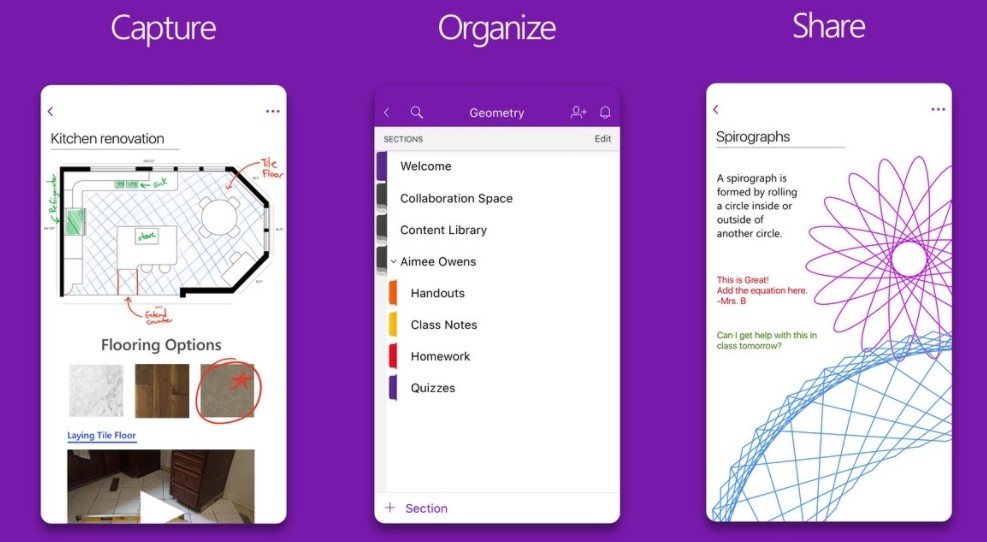
Alternatives: Evernote, Quip, G Suite
Want to successfully manage workflows and performance of remote team members? Hubstaff is one of the most successful tools that simplifies the processes of a product manager and adds transparency to team collaboration.
Using this time tracking service, you can set time or cost limits for your projects, as well as limits for each team member. You can track attendance planning, activity levels and other organizational issues. The tool allows you to take screenshots of the team’s work and provide you with this data remotely.
Hubstaff is represented by a free and paid subscription.
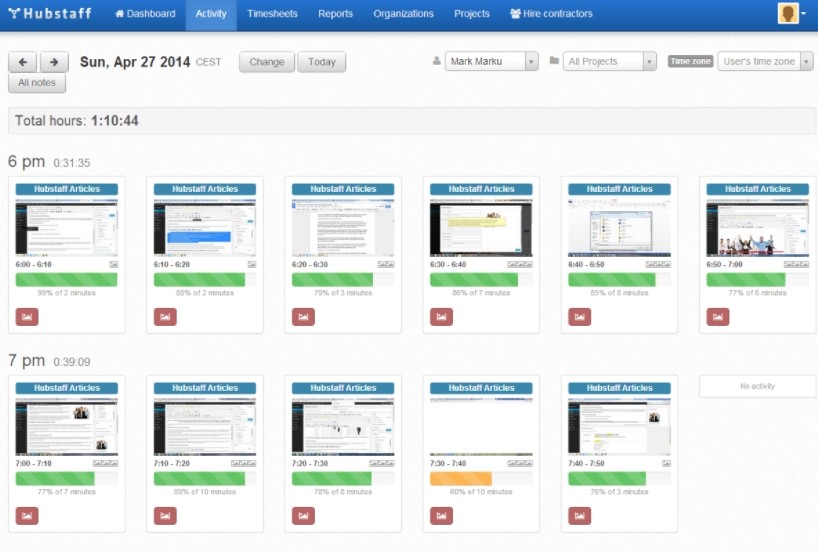
Alternatives: FreshBooks, Click time, Scoro, TimeCamp, Toggl
Most large global corporations are aware of Confluence . This tool helps to organize teams and centralize all the information needed to synchronize actions.
Confluence offers a user-friendly interface where you can create meeting notes, set up project plans or product requirements, use templates, write comments, and get feedback. All in one place. Here you can also use add-ins, such as team calendars to schedule events or discuss issues and voting.
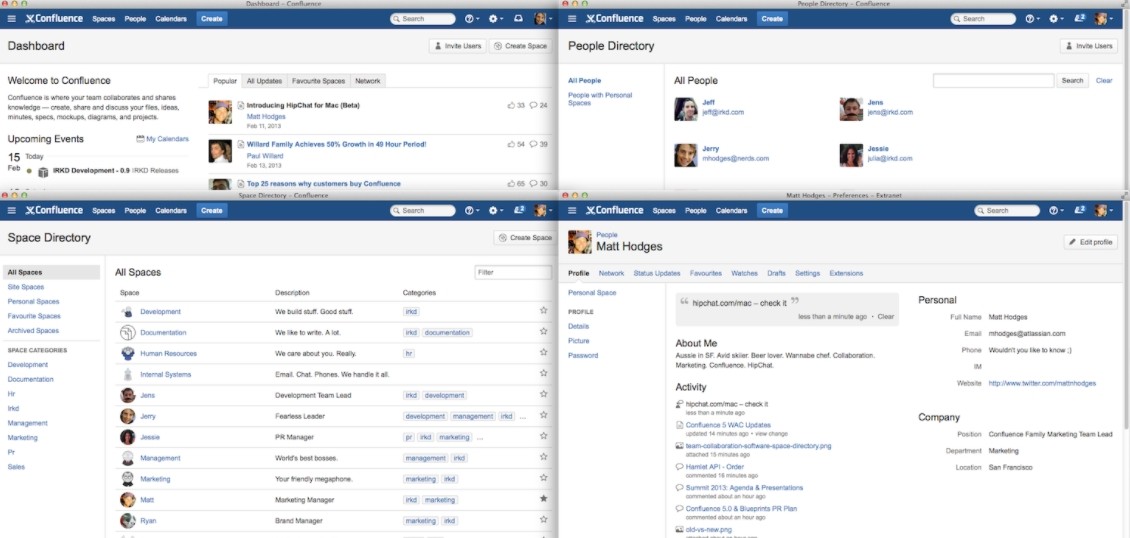
Alternatives: Guru, Bloomfire, Nuclino, Crowdbase
Popular online storage is used by more than 500 million users worldwide. Dropbox allows you not only to store all your files together in one place, but also to share them with other team members.
You can send links by email or chat rooms, leave feedback and share access to your documents from any device.
Dropbox is free for individual use, but you have to pay for a business plan to get more space or more access.
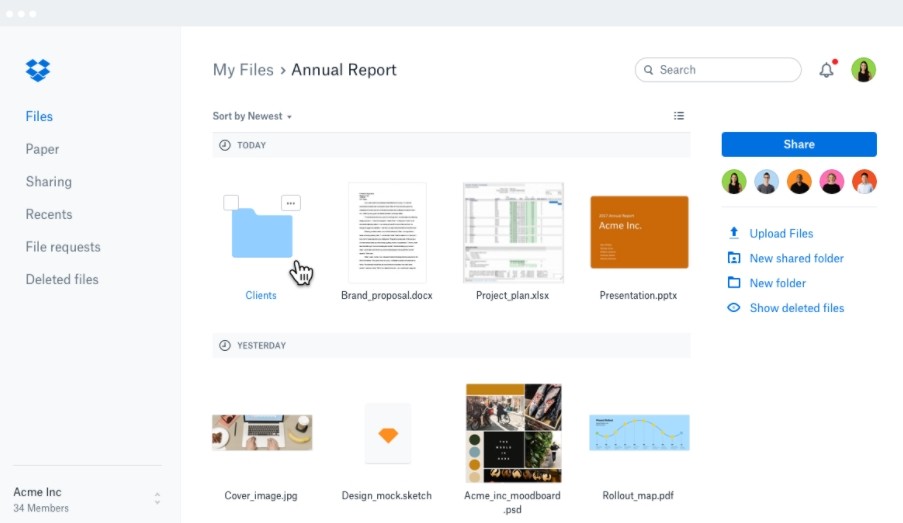
Alternatives: Hightail, MediaFire, Tresorit, ShareFile
You can say that this is an example from the "past century." But, in fact, Yammer is one of the first social networks created specifically for the internal needs of office teams. The service is popular today no less than before. Team members can post updates and chat in groups and channels using this tool.
Three main advantages of using Yammer for internal or even external interaction: ease of use, the availability of a mobile version and the possibility of cooperation with external users.

Alternatives: Jive-n, Facebook workplace
Marvel is known worldwide as one of the easiest programs for business layouts. It helps managers and teams collaborate together on mobile devices, tablets, and desktop prototypes of applications and websites.
If you work with different departments or clients, this tool allows you to organize your work in a more efficient way.
You can add your feedback directly to the prototypes and annotate the areas you want to highlight. Customers can post comments without having to subscribe to Marvel.
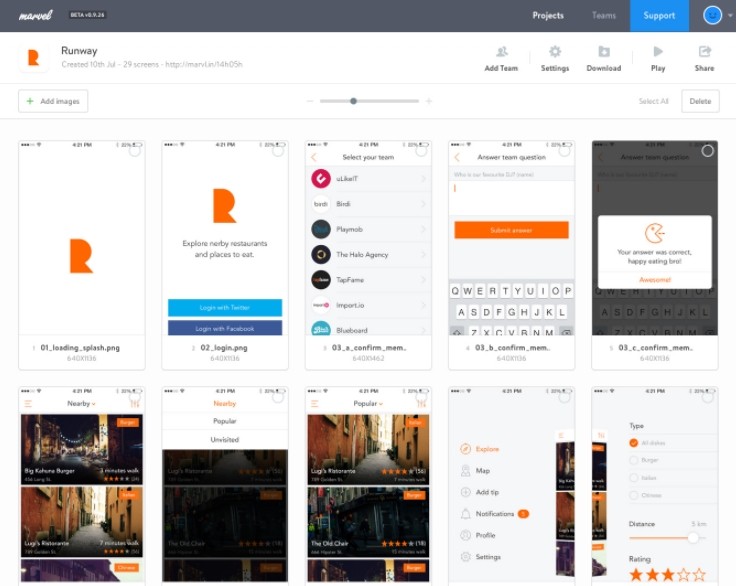
Alternatives: Mockup.io, InVision, Flinto.
How many of the described services have you used in your work? Did they seem really helpful to you or was it worth paying attention to alternatives? Share your experiences in the comments!

Any motivated product manager should not only take care of professional skills, learn new methodologies and apply the latest grow hacks , but also try to create a strong and successful team.
What makes teams stronger and stronger? Well-established cooperation inside is one of the key aspects that help teams cope with complex tasks and withstand any obstacles. A united team is the dream and goal of any product manager.
')
What is the power of cooperation? And what secret tools help managers create strong teams?
“To lead is not to hinder good people from working”
Sergey Kapitsa
What tools are best for team collaboration?
Naturally, any professional tool for a manager and a team is not a panacea.
Product managers should think about the quality of communication, starting with interviews, employee's probationary periods, and knowing how to brainstorm properly . Even after a successful release during team building, it is important to think about how to raise the level of team collaboration to a new level.
This article describes 9 types of tools that will help create a strong team spirit and streamline team workflows. All of these tools have different goals, some of them are paid, some are free. Some of them are suitable for all products, and some highly specialized.
This list is quite subjective, therefore, after each given example, several alternatives are proposed so that any reader can choose the best for himself from the above:
- Communication tools
- Project and product management platforms
- Services for the organization of remote communication and video conferencing
- Document Services
- Time tracking tools
- Database systems
- Special file sharing tools
- Internal social networks
- Tools for layouts and prototypes.

Communication tools
Example: Slack
Slack is a real-time chat service that has gained rapid popularity after being distributed to Silicon Valley companies.
The service works on the basis of channels and includes voice and video calls, although these Slack components are not as popular as text chat rooms. Here you can add pictures, emoji, GIF, share documents and organize group chats.
How does Slack work?
You can use Channels as chats or public streams. This can be done in just a few clicks. You can also write directly to a specific contact, attach documents and files for him.
The “Private Groups” option allows you to organize conversations with specific team members. You can invite developers, sales professionals, HRov and so on.
All content in Slack is searchable from a single search box. You can also use the help of the Slackbot bot, which can give you more information, remind you of urgent matters and be useful on other issues.

Alternatives: HipChat, Microsoft Teams
Tools for project and product management
Example: Hygger.io
Hygger is a complete product management platform for growing companies. The service can be used to work together in small and large teams. Hygger offers a range of quality and useful features:
- Comfortable Kanban boards with WIP limits, Swimlanes, sub-columns options, time tracking.
- Kanban-based sprint boards for programmers working on the Scrum methodology.
- Backlog board for collecting and structuring ideas and initiatives, as well as a convenient Backlog Priority Chart schedule for prioritizing and visually ranking ideas.
- The method of ranking ideas by assessing their degree of influence and labor costs.
- A quality roadmap for planning future releases, projects and initiatives.
- Functions Burndown Chart, Velocity and more.
All these functions and suggestions help to manage the product life cycle and optimize team collaboration by tracking every step of all team members, without losing any small details.

Alternatives: Trello, Aha, Asana.
Tools for organizing remote communication and video conferencing
Example: Hangouts
The service is widely used by companies for internal remote communication as an instant messaging or screen-sharing video conferencing. It helps to organize meetings and presentations without a special separate planning tool. You can send invitations to any team member and coordinate actions right in the sidebar.
Individual chats allow team members to collaborate in a group project, chat with colleagues, customers or other team members, make changes to Google docks, etc.

Alternatives: Skype, Amazon Chime, Join.me
Document Services
Example: OneNote
OneNote will be useful if you need to control the movement of documents and share them with your team. This is a kind of collaborative notebook that makes it easy to distribute a large amount of data among team members.
OneNote is more than just working with documents. Many companies use it as an ideal tool for project management in teams. This is a free tool. Using different sections and OneNote pages, you can provide your team members with relevant information at any time that is convenient for you. Here you can create multiple sections and sub-pages for storing important data.
OneNote allows you to share information from any device.

Alternatives: Evernote, Quip, G Suite
Time Tracking Tools
Example: Hubstaff
Want to successfully manage workflows and performance of remote team members? Hubstaff is one of the most successful tools that simplifies the processes of a product manager and adds transparency to team collaboration.
Using this time tracking service, you can set time or cost limits for your projects, as well as limits for each team member. You can track attendance planning, activity levels and other organizational issues. The tool allows you to take screenshots of the team’s work and provide you with this data remotely.
Hubstaff is represented by a free and paid subscription.

Alternatives: FreshBooks, Click time, Scoro, TimeCamp, Toggl
Database Tools
Example: Confluence
Most large global corporations are aware of Confluence . This tool helps to organize teams and centralize all the information needed to synchronize actions.
Confluence offers a user-friendly interface where you can create meeting notes, set up project plans or product requirements, use templates, write comments, and get feedback. All in one place. Here you can also use add-ins, such as team calendars to schedule events or discuss issues and voting.

Alternatives: Guru, Bloomfire, Nuclino, Crowdbase
Tools for sharing information (file sharing)
Example: Dropbox
Popular online storage is used by more than 500 million users worldwide. Dropbox allows you not only to store all your files together in one place, but also to share them with other team members.
You can send links by email or chat rooms, leave feedback and share access to your documents from any device.
Dropbox is free for individual use, but you have to pay for a business plan to get more space or more access.

Alternatives: Hightail, MediaFire, Tresorit, ShareFile
Internal social networks
Example: Yammer
You can say that this is an example from the "past century." But, in fact, Yammer is one of the first social networks created specifically for the internal needs of office teams. The service is popular today no less than before. Team members can post updates and chat in groups and channels using this tool.
Three main advantages of using Yammer for internal or even external interaction: ease of use, the availability of a mobile version and the possibility of cooperation with external users.

Alternatives: Jive-n, Facebook workplace
Services for layouts and prototypes
Example: Marvel
Marvel is known worldwide as one of the easiest programs for business layouts. It helps managers and teams collaborate together on mobile devices, tablets, and desktop prototypes of applications and websites.
If you work with different departments or clients, this tool allows you to organize your work in a more efficient way.
You can add your feedback directly to the prototypes and annotate the areas you want to highlight. Customers can post comments without having to subscribe to Marvel.

Alternatives: Mockup.io, InVision, Flinto.
How many of the described services have you used in your work? Did they seem really helpful to you or was it worth paying attention to alternatives? Share your experiences in the comments!
Source: https://habr.com/ru/post/352130/
All Articles